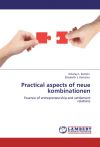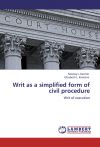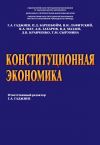Правообладателям!
Представленный фрагмент книги размещен по согласованию с распространителем легального контента ООО "ЛитРес" (не более 20% исходного текста). Если вы считаете, что размещение материала нарушает ваши или чьи-либо права, то сообщите нам об этом.Читателям!
Оплатили, но не знаете что делать дальше?
Текст бизнес-книги "The implementation of the economic cycle: freedom, trust, duty"
Автор книги: Николай Камзин
Раздел: Экономика, Бизнес-книги
Текущая страница: 3 (всего у книги 3 страниц)
The main body of the foreign exchange regulations of the Russian Federation is the Central Bank of Russia. It defines the scope and procedure of appeal to the Russian Federation, foreign currency and securities in foreign currency, sets the rules for the residents and Russia operations with foreign currency and securities in foreign currency, as well as rules for non-residents operations with rubles and securities in rubles; establishes the procedure for compulsory transfer, import and transfer to Russia of foreign currency and securities in foreign currency belonging to residents, as well as events and conditions of opening resident foreign currency accounts with banks outside of Russia, sets out general rules for licensing credit institutions to carry out foreign exchange transactions and issues such licenses, establishes uniform forms of accounting, reporting, documentation and statistics of currency transactions.
The main methods of monetary control are:
– Currency intervention (buying and selling foreign currency to national);
– Central bank operations in the open market (buying and selling of securities);
– Change in central bank interest rates and (or) reserve requirements.
Exchange controls exercised by exchange controls and their agents. Currency control bodies are the Central Bank and the Government of the Russian Federation. Currency control agents are organizations that are in accordance with legislative acts may perform the functions of currency control.
The main directions of monetary control are:
– Determination of compliance of foreign exchange transactions with current legislation and the availability of necessary licenses and permits;
– To verify that the residents of foreign currency liabilities to the state, the validity of payments in foreign currency, completeness and objectivity of accounting and reporting of currency transactions and for transactions with nonresidents in rubles.
The object of national and transnational regulation is currency restrictions and currency convertibility regime.
As rightly pointed out Frederic Bastiat «you cannot give money to some members of the community but by taking it from others»[32]32
Bastiat Frederic. The Bastiat collection. Volume I. – Auburn: Ludwig von Mises Institute. 2007. – P. 219. (вы можете давать деньги одним, только отобрав их у других).
[Закрыть]. Cash is in fact equivalent to existing facilities, money is their «mirror image», and, therefore, imperative redistribution of opportunity or simply move the cost of changing the terms without affecting the sum.
Foreign exchange restrictions – is introduced in legislation or regulation, restriction of operations with national and foreign currency, gold and other currency values.
Distinguish restrictions of payments and transfers for current transactions balance of payments and financial transactions (is transactions involving the movement of capital and credit), the operations of residents and nonresidents.
The number and type practiced in the country depends on foreign exchange restrictions convertibility regime. Currency convertibility (reversibility) – is the ability to convert (exchange) currency of the country for the currencies of other nations. Distinguish between free or fully convertible (reversible) exchange, partially convertible and nonconvertible (irreversible).
Fully convertible («freely usable» in the terminology of the IMF) are the currencies of the countries in which virtually no foreign exchange restrictions on all types of operations to all holders of currencies (residents and nonresidents). In partial convertibility of the country remain restrictions on certain types of operations and / or to individual holders of the currency. If the limited possibilities for conversion of non-residents, the convertible is called outer if non-residents – domestic. What matters most is convertibility on current account of balance of payments, it is possible without restrictions to the import and export goods. Most industrialized countries have switched to this type of partial convertibility of the mid-60s of the twentieth century.
Currency is not convertible, if the country has almost all kinds of restrictions and, above all, a ban on the purchase – sale of foreign currency, its storage, export and import. Inconvertible currency is typical of many developing countries.
3.5. Exchange rate regimeExchange rate regime characterizes the order setting exchange ratios between currencies[33]33
Джеффри А. Фрэнкел Что актуально и неактуально в мире международных денег // Финансы & развитие. 2009. С. 13.
[Закрыть].
Distinguish between fixed and «floating» exchange rates and options, which combine in various combinations of the individual elements of a fixed and «floating» rate. Such a classification of exchange rate regimes generally conformed to the IMF currency division into three groups:
Конец ознакомительного фрагмента.
Текст предоставлен ООО «ЛитРес».
Прочитайте эту книгу целиком, купив полную легальную версию на ЛитРес.
Безопасно оплатить книгу можно банковской картой Visa, MasterCard, Maestro, со счета мобильного телефона, с платежного терминала, в салоне МТС или Связной, через PayPal, WebMoney, Яндекс.Деньги, QIWI Кошелек, бонусными картами или другим удобным Вам способом.
Внимание! Это ознакомительный фрагмент книги.
Если начало книги вам понравилось, то полную версию можно приобрести у нашего партнёра - распространителя легального контента ООО "ЛитРес".Правообладателям!
Представленный фрагмент книги размещен по согласованию с распространителем легального контента ООО "ЛитРес" (не более 20% исходного текста). Если вы считаете, что размещение материала нарушает ваши или чьи-либо права, то сообщите нам об этом.Читателям!
Оплатили, но не знаете что делать дальше?






